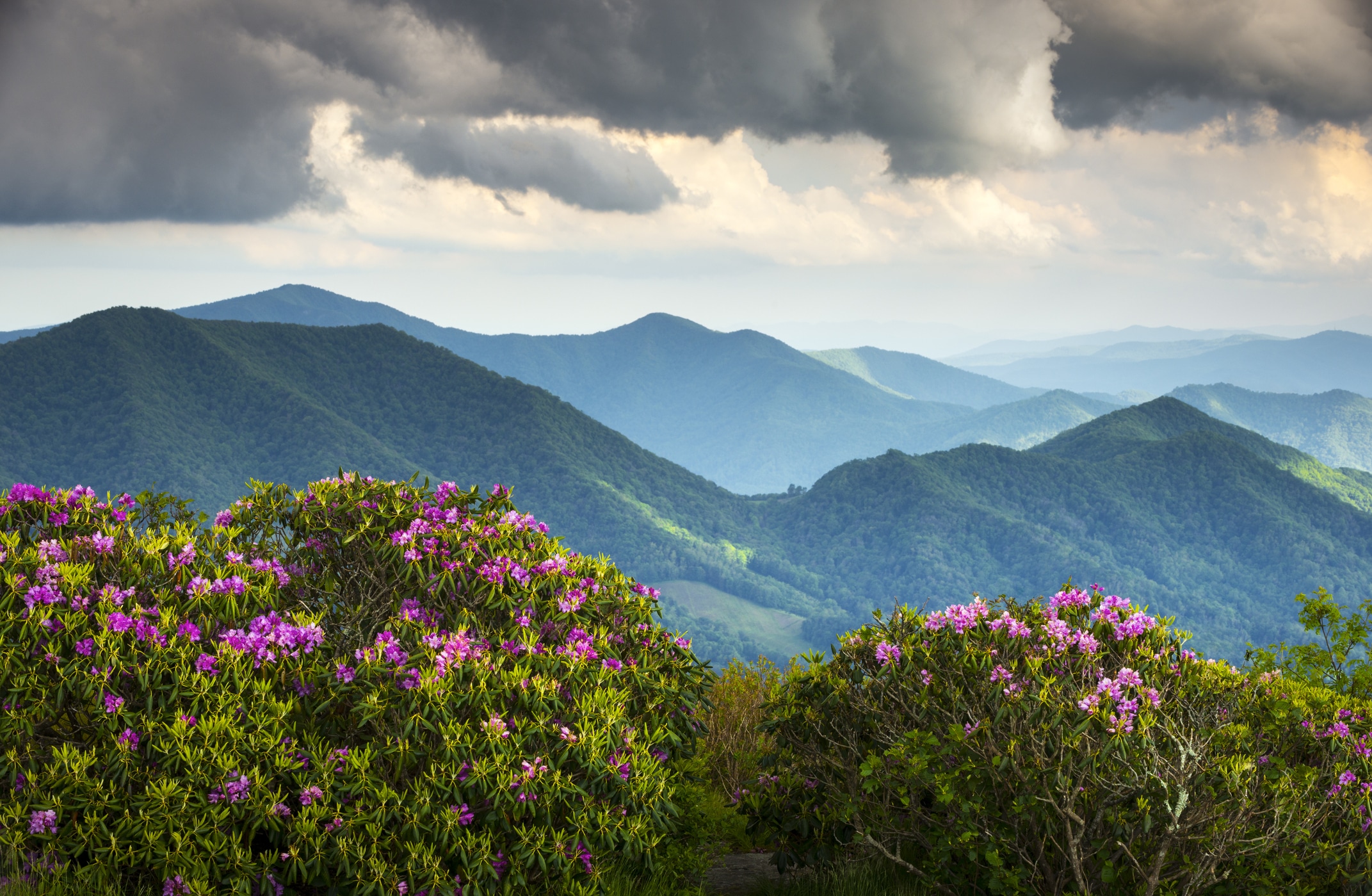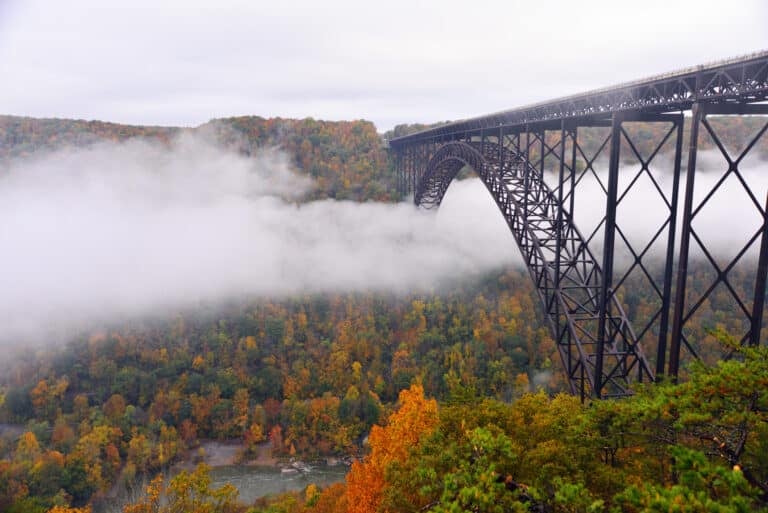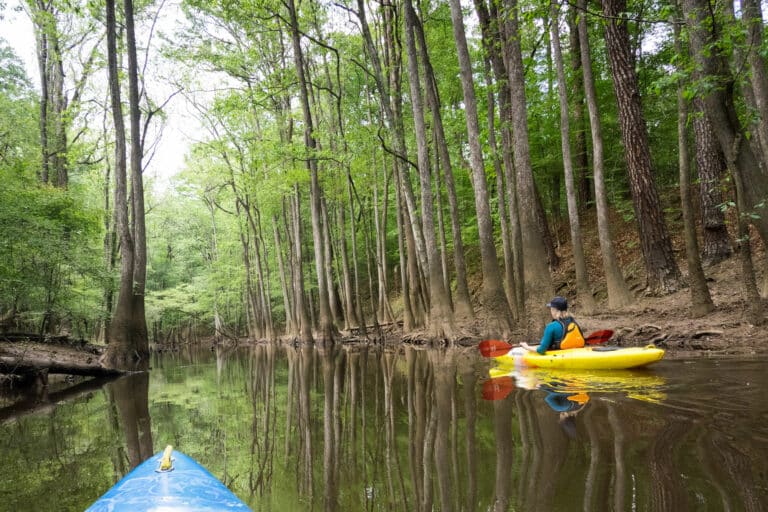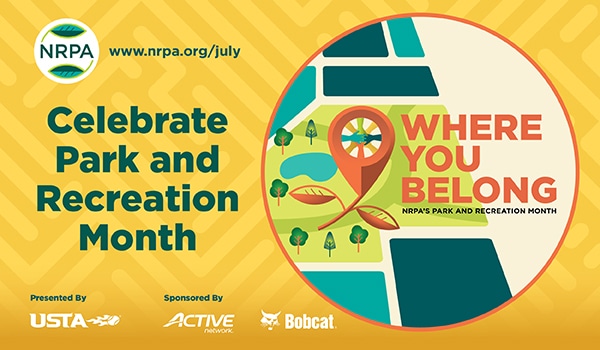The outdoors is open.
Photo: Blue Ridge Appalachian Mountain Peaks and Spring Rhododendron Flowers Blooming along the Appalachian Trail in Western NC – courtesy of Getty Images
That’s the phrase we heard in March, as the novel coronavirus began its march across the country. It reminded people that, while school, hugs, and public spaces were suddenly ticking time bombs, there was still peace—and adventure—to be found in the great outdoors.
But as the pandemic worsened, the phrase no longer held true. Trails shut down, campgrounds closed, national, state, and local parks locked their gates, and for the first time in recent memory, the outdoors wasn’t open any longer.
Two months later, the outdoors is opening again—with precautions.
“Our shop has been closed since March 20,” says James Revercomb of Roanoke Mountain Adventures, a full service outfitter offering rentals, shuttles and guided trips for mountain biking, road biking, paddleboarding, kayaking and tubing. “Our thought was we wanted to be on the safe and conservative end of this for staff, customers and the community.”
In the last few weeks, Revercomb says that the company has begun opening their gear consignment shop by appointment only and renting paddleboards and other outdoor gear. “We sanitize them and do everything outside,” he says, to lower their chance of spreading the virus.
Inside his shop, Revercomb has installed plexiglass barriers at the register and is only allowing 10 people to enter at one time. All staff are required to wear masks. Surfaces are sanitized regularly.
River shuttles, which are a big part of Revercomb’s business, have been shuttered for now. “We don’t feel that’s a safe thing to do at the moment,” he says. Equipment shuttles, however, are on.
A recent NPR article asked medical experts to rank the risk of catching COVID-19 while engaging in a number of beloved summer activities, including camping and exercising outdoors. Perhaps unsurprisingly, both were categorized as low risk.
“As far as summer activities go, [camping] is least risky from a virus perspective,” Rebecca Katz, director of the Center for Global Health Science and Security at Georgetown University Medical Center told NPR. “You’re outdoors and isolated.” Of course, the risk is higher if you are camping at a crowded campground with shared bathrooms.
Hiking and running are also considered low risk. “If you’re not on a crowded path where people are brushing past each other, then I think [they’re] a great form of exercise right now,” Kimberly Powers, an epidemiologist at the University of North Carolina at Chapel Hill, was quoted as saying in the same report.
But while the inherent risks may be low, guides and business owners in the outdoor industry are still taking them very seriously.
“So much of our job is risk management because of the nature of what we do,” says Trey Barnett, Regional Marketing Director of Wildwater, the oldest outfitter in the Southeast. Wildwater runs whitewater rafting, ziplining, and lodging experiences at five locations throughout Georgia, South Carolina, North Carolina, and Tennessee. “While the coronavirus is a new risk, the process of looking at it has already been established,” he says, adding that while their experience handling risk “didn’t make us any more comfortable [with the virus], it did make us a little more prepared.”
Wildwater suspended all activities in mid-March. As they begin reopening, they’re taking action to ensure the safety of their staff and their customers by encouraging increased handwashing and sanitizing, using online waivers to decrease touchpoints, asking that only group leaders report to the office for check-in, limiting capacity inside facilities, implementing extra cleaning procedures for equipment, and adjusting bus loading procedures to decrease contact. They’re also offering private rafting trips for groups that are weary of mixing with others.
Barnett says, for the most part, customers have been supportive of the new safety measures. “We don’t have much pushback,” he says. Revercomb, too, says that his customers have also been “great and very cooperative. They understand why we’re doing what we’re doing, and they want to support small business.”
“The outdoors are going to be pivotal for a lot of people going forward,” Revercomb adds. “We’re all itching to get outside for our wellness and well-being. We want to restore normalcy. But we want to do that in a safe and responsible manner.”








